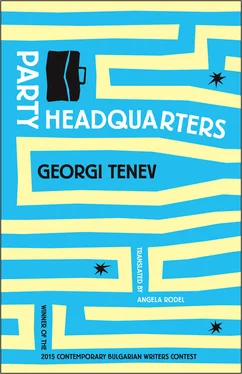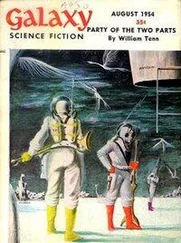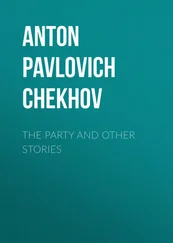“Yes, you’re right, you’re absolutely right,” I tell him to get him to shut up. I wrap myself up in the blanket. The vodka warms me pleasantly because it’s pure and good, made by our brothers — these are former Soviet airlines, after all. Arrival in Kazakhstan: on time.
The Third Bulgarian Cosmonaut
To buy a trip to the cosmos, to pay a million and then some for it — I’m proud of this idea. But I need to be completely prepared, physically as well as financially. Medical exams, yes, and all those procedures.
The leader of the pre-launch cycle — Shatrov, Valentin Ivanovich — arrives on his bicycle, which is about twenty years old, Ukraine brand. The chain is always well greased. He carries the folders and training charts in a lovingly preserved plastic bag with the West Cigarettes logo on it and handles that have worn thin. There’s no longer any need for me to be amazed, it would be terribly impolite in any case — not by the state of his bag or his shirt or his ratty jacket with its frayed sleeves. The glasses sitting on his nose — plastic frames, a unisex model with bifocal lenses — are held together on one side by a Band-Aid wrapped around the broken rivet.
In this unchanging form, Shatrov sits behind mountains of equipment that can conquer gravity or that, under different circumstances, could set off a fatal intercontinental war. He spins in the chair, covered in plaid upholstery that sticks up here and there at the edges of the back rest. He observes the censors, fills in the charts with a cheap pen, and in that unmistakable, soft Russian way gives me directions over the microphone, which is as gray as an antique cartridge. The microphone hangs at the end of an even grayer cord — that gray left in the past along with Bakelite and tube televisions. Insulation material made fragile by time, sclerotic arteries that have lost their elasticity — they are no longer manufactured in any chemical factory anywhere in the world. They’ve been replaced by modern rubber, ultra-flexible, which doesn’t slide between your fingers even when it’s sweaty.
But I, in a jumpsuit under the spacesuit, am sweating buckets. The inside of the uniform isn’t padded, there are no ventilation holes along the seams or in the underarms or thighs. The humbleness of it all, the old-fashionedness, the wear-and-tear — it doesn’t worry me, on the contrary — it inspires me. I know, I’m convinced it’ll launch me into those dark heights over our heads with sufficient safety. And there will be so many stars up there that everything brought along from earth will lose its significance.
The old emblems haven’t even been torn off the jumpsuits. Gold letters over the blue silky image: a round planet embroidered between wreaths of wheat, with the inscription “USSR.” This reminds me of how, during the 1950s, K-shev had tried to unite us with the Soviet republics on the sly. Now, Mr. First Secretary, we can try again together.
I received a full set of clothing taken out of storage, still in rustling cellophane wrappers. I have underwear with strong seams that gives off some old smell, maybe camphor. Pure cotton, cream-colored, like ivory. Also T-shirts, with three-quarter-length sleeves. Shoes, socks without heels, and a pair for running that go all the way to the knee. The pants have little slits for attaching the small galvanized hooks at the end of the belts, which connect at the lower back to something like a seat — almost like a diaper of soft cloth, but green instead of white and as furry as an astrakhan. Thus wrapped, I sit in the hollowed-out shell of the training chair. Then in the catapult. The gray jacket is short in the waist, while its collar is rubbery, somehow alive from the tension of the elastic sewn inside. Muscles of natural caoutchouc, I catch a whiff of its stinging scent around my face. The same smell inside the space suit with the round glass helmet that my head disappears into. My body comfortably hides in the hermetic cocoon with its big, soft paws — inside I move my hands, enjoying the slow movements. My thumbs, magnified ten times over, wiggle impossibly far away from me. I’m ready to go out into the open cosmos, or at least I’m technically ready.
The pre-launch program has been reduced to a minimum. Shatrov isn’t happy about it, but what can you do? I suspect that he soothes his conscience at night with vodka. Poor guy — he probably has to buy the bottle with his own money, taken from his miserable salary. He even unscrews the cap, but only lets me sniff it— Kosmicheskaya , with three red stars skewered above a blue rocket, like a drawing out of a children’s book.
I ought to buy him a few rounds, I say to myself, I should come up with some kind of present for him once everything’s finished. Because, I assume that I’ll see him again at the end . I haven’t been completely informed regarding that question, but Shatrov has been with me continually since the very beginning, eighteen hours a day. It would seem impossible for him not to be the first one to greet me when the capsule with the landing apparatus hits the soft black earth, the wheat fields of Kazakhstan.
Traveling in space has many wonderful aspects and one terrible one — which is the further away you get from the earth, the more visible the distance between you and your earthly life becomes. And it becomes that much sadder and harder for you to accept the magnitude of the time needed to return. This feeling grows and keeps growing, except if you decide not to return at all.
But the most important thing is to scatter K-shev’s ashes completely, with no leftovers, in the airless, non-orbital cosmos.
The rocket is beautiful, beautiful and proud. Where is Comrade Todorov, my morals and law teacher, if only he could see me now. Look, Comrade Todorov — and you thought I was joking. Do you see me? — that’s me in one of the reclining seats in the cockpit surrounded by all these machines. Metal, uniformly spaced rivets. I don’t know which one holds more significance for my life — Chernobyl or Baikonur? Perhaps both things had to happen to me, in precisely the right order. Because I now possess a body of cells that have been irradiated deep down. A body that sits calmly and decisively in the transport cabin. The cosmos calls to me. The very same cosmos promised by those reprinted Russian popular science books from my childhood. School bulletin boards and pictures from Pioneers and Rockets magazine, strangely mixing into the general brownish-blue mass. The rocket now is beautiful and majestic.
The rocket, Energia , a thousand-ton giant. The terror of seeing the enormous mechanism, which was created to start up only once. I see a square of its light hull through the cockpit’s side window. The reusable space shuttle Buran —pride of the erstwhile Soviet space and aeronautical industry — attached to the launch rocket with three hydraulic and three mechanical suction cups. Tucked beneath them are the pyrotechnical systems, stuck on with a gray gum, the glue that guards against an undesirable premature explosion. Later, in orbit, this final stage will also become unnecessary. And then the soft explosions will pry them apart: the Energia from the Buran on its side, and the Buran from the Energia , until recently hitched together. They will reach that cherished altitude and afterward never meet again. Except perhaps in the ions of the glittering atmosphere, on its grating upper edges. There, where the corona of earthly air comes up against the cosmic nothingness. There, when the shuttle returns through the sizzling layers, breaking them like chains. In the flames washing over its hull, the Buran will again caress the slender rocket. The Energy , broken up, shattered into basic pieces, will once again embrace the shuttle.
Читать дальше












